Rod Miller's Blog, page 23
March 5, 2018
Rawhide Robinson trades cows for camels.
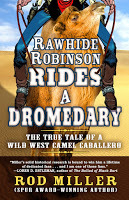
(Note to readers: We will return to our usual literary nonsense following this brief commercial message.)Don’t worry. Giving up horses and cows is only a temporary aberration for Rawhide Robinson. Just as our ordinary cowboy hero traded cattle for cats in Rawhide Robinson Rides the Tabby Trail , in his latest adventures(s), we find him delivering dromedaries. Rawhide Robinson Rides a Dromedary: The True Tale of a Wild West Camel Caballero is loosely—very loosely—based on the US Army’s experimental use of camels as pack animals in the southwestern deserts. And if you think herding longhorn cattle and Chicago alley cats is fodder for fantastical escapades, wait till you read about our cowboy’s exploits on the high seas and at Levantine ports of call.As usual, Rawhide Robinson spins tall tales as easily as a loop, and sailors find his stories every bit as entertaining as cowboys do.Western Writers Hall of Fame member Loren D. Estleman says the book is “rich in color, texture, and relentless forward movement.” Booklistsays, “Rawhide’s over-the-top storytelling is complemented by Miller’s slapstick humor and verbal gymnastics.” Rawhide Robinson Rides a Dromedary is hot off the press. Watch the short videofor a taste of what’s inside the covers, and visit RawhideRobinson.com to read an excerpt. And, of course, buy the book.End of crass commercialism. Tune in next time for something altogether different.
Published on March 05, 2018 06:13
February 26, 2018
Wisdom from Down Under.
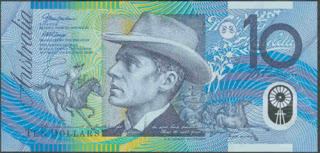
Unless you’re from Australia, you might not recognize the picture above as a $10 bill. I have one just like it, courtesy of outstanding bush poet, reciter, and storyteller from Down Under, Jack Sammon, who I had the pleasure of meeting at the National Cowboy Gathering in Elko, Nevada. I’ll probably never get to Australia to spend it. But I wouldn’t anyway, as I consider it a work of art. In fact, it is framed and hanging on the wall in my office.The portrait on the note is of A.B. “Banjo” Paterson. Few would disagree that he is the finest poet Australia has ever produced, and his work is known the world over. Here in America, he is especially loved by aficionados of cowboy poetry. You’ll notice the running horses and horseman on the bill. They’re illustrative of one of Paterson’s most famous poems, “The Man from Snowy River.” The first two lines of the poem appear along the bottom. And, if you have a microscope, you can read the entire text of the poem in microprint on the note as a security feature. You’re probably familiar with the poem and its celebration of courage and daring and what we would call “The Cowboy Way.” Clancy, a central character in the story, is also the subject of my favorite Paterson poem, “Clancy of the Overflow.” And he wrote the Australian folk anthem, “Waltzing Matilda,” which is also featured on the bill.But I digress. The promised wisdom? Jack Sammon talked about the $10 bank note before reciting “The Man from Snowy River” at the Gathering. He said, “We’re kind of backward down in Australia compared to America—instead of politicians, we put poets on our money.”Who do you think is backward?
Published on February 26, 2018 06:19
February 17, 2018
Lies They Tell Writers, Part 43: Read Aloud What You’ve Written.

Some writing instructors advise aspiring writers to read aloud what they’ve written. They say doing so will reveal awkward phrasing, faulty rhythm, poor word choice, and other sins. It’s true. Sometimes.Reading aloud is particularly apt when writing poetry, especially if that poetry is to be recited. But reading prose aloud isn’t always a good idea.Having written a ton and a half of advertising copy over the course of some four decades, I learned long ago that writing words to be vocalized—as in radio or television commercials—is altogether different from writing words to be read—as in printed advertisements.That’s because the brain is much more adept than the vocal cords. Your mind can wrap itself around more complex sentence constructions, accept more assonance and consonance and alliteration without getting tongue-tied, easily switch rhythmic patterns to follow dialogue, fill in the blanks purposely created by ambiguity and other techniques to involve readers, understand sentence fragments, and on and on and on.The written word and the spoken word are entirely different things. Different languages, almost. The trick, in both cases, is using words well. Go ahead and read your work aloud. But don’t believe for a minute that your mouth is a better arbiter of what’s right in writing than your brain.
Published on February 17, 2018 05:05
February 8, 2018
Cowboy Poetry with Pickles.
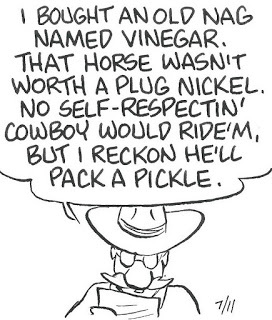
Last week I had the good fortune to once again attend the National Cowboy Poetry Gathering in Elko, Nevada. As usual, a good time was had by all. How could you go wrong reconnecting with old friends, meeting new ones, and sitting through hours (and hours and hours) of the best cowboy poetry and music the world has to offer? This year brought an unexpected and unusual treat. Fans of the “Pickles” comic strip know that on a few occasions, the curmudgeonly Earl Pickles has dipped his toes into the waters of cowboy poetry. As it happens, Brian Crane, the author and artist behind “Pickles,” is an old and dear friend and coworker and business partner. For some 40 years we have been close friends, if usually distant neighbors. When Earl was infected with poesy, I had the opportunity to work with Brian on some of his character’s poetic efforts.Brian came to his first Gathering with, of course, Earl in his pocket, to breathe the rarified air at cowboy poetry’s heights. Not only was it good to see and spend time with Brian again, I got a big kick introducing him to friends and enjoying their shock and surprise then smiles when I told them what he did to earn his daily bread, as so many of them are “Pickles” fans. (It often embarrassed Brian and he wished I wouldn’t brag on him, but he well knows I am not to be trusted.)I will be surprised if Earl’s poetic proclivities weren’t inspired by his time in Elko, and expect the funny papers will be seeing more of his versifying in the future.
Published on February 08, 2018 13:55
January 31, 2018
Lest we forget.

January 29 is a dark day in the history of the American West. Early on that morning in 1863 the United States Army attacked a Shoshoni winter camp on the Bear River, just across the Utah border in what is now Idaho. As the sun climbed to its zenith, the soldiers slaughtered somewhere between 250 and 350 people, most noncombatants and many women and children. Witnesses also reported torture, rape, and mutilation.The Bear River Massacre was the first big Indian killing by the army in the West, and it was the worst—more victims than Sand Creek or Wounded Knee or other better-known incidents. And yet it is largely forgotten, seldom finding its place in history books, and accounts are often erroneous. We visited the killing field on the anniversary again this year, joining with the Northwestern Band of the Shoshone Nation to commemorate the massacre and celebrate the survival of the Band, most of which was wiped out that day. For many years, the Bear River Massacre has intrigued me. How such a pivotal event in our history can go unnoticed troubles me. I have written about the massacre in a song with Brenn Hill, “And the River Ran Red,” in poems, in short stories, in a chapter of The Lost Frontier: Momentous Moments in the Old West You May Have Missed , and in a history book, Massacre at Bear River: First, Worst, Forgotten . Never should such heinous actions by our government be forgotten. They remind us of the depravity we were—and are—capable of. Mark your calendars, and join us next winter on that hallowed ground on the banks of the Bear River.
Published on January 31, 2018 05:25
January 23, 2018
Trail gone cold: Dusty Richards.
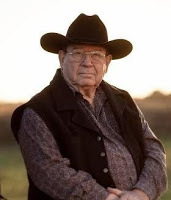
The world lost something big last week. And in that part of the world known as the American West, the loss looms even larger.Dusty Richards died January 19 from lingering injuries suffered in a traffic accident. Dusty’s death means we’re short one of our finest Western writers, a long-time rodeo announcer, and a lively auctioneer. As if that weren’t enough to fill a lifetime, Dusty also had a successful career in agribusiness, taught school, and broadcast farm reports on television. He served as president of Western Writers of America and was founder and executive editor of Saddlebag Dispatches magazine. And 150 or so Western novels are filled with Dusty’s words. Some of those books have his name on the cover; many he wrote using other names. Besides all that, and more important than any of it, Dusty was friendly, sociable, kind, and helpful to any- and everybody, anytime. You couldn’t begin to count the number of aspiring writers Dusty helped along the way with encouragement, advice, introductions, referrals, recommendations, and more. I count myself among those he helped, and couldn’t count on all my fingers and toes all the times he went out of his way to show me how to be a writer. It bears mentioning that Pat, his wife and friend and constant companion, is also lost to us owing to the same accident. We can take comfort in the fact that they are back together after a brief time apart. And we can rest assured knowing that Dusty is, at this very moment, no doubt bending the ear of Saint Peter—and anyone else within range of his big voice—with an engaging story about the West he loves.
Published on January 23, 2018 07:32
January 17, 2018
Writing in my sleep.
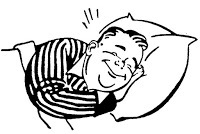
Over the years I have heard and read any number of ways writers go about their business. Most are relatively straightforward, others a little quirky. There is, for instance, a writer from Texas who strolls the streets at night with pencil and paper in hand, writing as he walks. There are people who do not write unless certain conditions apply: a prescribed number of freshly sharpened pencils all lined up; a favored selection of music playing in the background; a cowboy hat perched atop the head. And so on. Me, I can and do and have written things anywhere and everywhere. In airports and on airplanes, on the bus, alone in my office, at the kitchen table surrounded by family, in motel rooms, at all times of the day and night, in front of the TV, with a radio or music or nothing playing…. Well, you get the idea.I also write in my sleep. Don’t ask me how it happens. But many (it would not be pushing it to say most) mornings, I wake up with a string of words stuck in my mind. If I went to bed with an advertising assignment pending, I would often awaken with an idea, a headline, and even a draft of the copy ready and waiting. It happens with poetry, too. A couplet, a quatrain, a stanza, even the basis for an entire poem may greet me with the sun. Or dialogue—a whole conversation between characters—for a novel in progress. A way to say a passage, an opening or closing line. An idea for a character, a story, a detailed concept for a novel, the framework for an essay or magazine article.Sometimes I even see it happen. In that not-quite-asleep-but-not-yet-awake time in the morning, ideas and words and phrases ricochet around in what passes for my brain and I just sort of lay there and snooze and watch as they turn into something useful.That’s all for now. I’m going to bed. Maybe, come the morning, I’ll have more to say.
Published on January 17, 2018 09:29
January 8, 2018
My Favorite Book, Part 12.
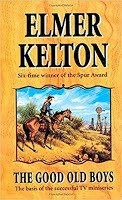
Browse any reader’s list of favorite Western novels and any one of several books by Elmer Kelton is likely to pop up pretty soon. The Day the Cowboys Quit. The Time it Never Rained. The “Lone Star Rising” trilogy. The Far Canyon. And on and on. I have read many Kelton novels and enjoyed every one. Some so much that you’ll find them on my list of books to re-read and read again. While, at some level, comparisons become silly, The Good Old Boys is probably my favorite among favorite Elmer Kelton books. For one thing, it’s lighthearted, even humorous at times. And, with a penchant for hyped-up action so common among Westerns, there aren’t nearly enough smiles in the genre. Beyond that, Hewey Calloway and Spring Renfro are people you’d like to know. So much so, in fact, you believe you do. They’re real right down to the core.I had the pleasure to know Elmer Kelton. A finer, kinder, more considerate gentleman you’ll never know. While talking about writing one time I heard him say that he believed the opening line of The Good old Boys was the best he’d ever written. If it has slipped your mind, here it is:
For the last five or six days Hewey Calloway had realized he needed a bath.
He’s right. You can’t help but read on.
Published on January 08, 2018 07:27
December 28, 2017
Passionate about avoiding passion.
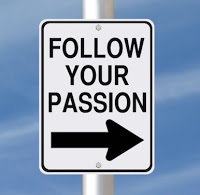
“Passion” has become one of those words you can hardly avoid. Barely a day goes by that you don’t hear someone asking someone (sometimes you), “What are you passionate about?” We’re encouraged to “follow our passions” and led to believe that life is not worth living if we’re not “passionate” about something.The more I think about it, the more I’ve come to realize that the only thing I’m passionate about is not being passionate.What’s the point of believing you are that intensely enthusiastic about something? About anything? Will you enjoy it more? Will you achieve more? Will it hold your interest any longer? I doubt it. It seems unlikely you are “passionate” about the same things you were “passionate” about, say, a decade ago. Or even last year.To my way of thinking, if you can’t get up the gumption to do what you want or like to do without whipping yourself into a passion, why bother? If you want to do something (as a famous maker of footwear for “passionate” runners used to say), just do it.I like to write. I enjoy the time I spend writing. I try to write well, and work at doing so. But I can’t say I’m “passionate” about it. I feel no need to work myself into a frenzy before stringing words together, nor do I feel I’m a failure if I decide to trim my toenails one day rather than whip out a sonnet. Maybe I’m just lazy. Apathetic. Ambivalent. Or dull. But it could be that I favor that old nugget of wisdom from the Greek poet Hesiod: “Moderation in all things is the best policy.”So, I ask you: What are you moderate about?
Published on December 28, 2017 09:44
December 18, 2017
Another dispatch from the saddlebag.
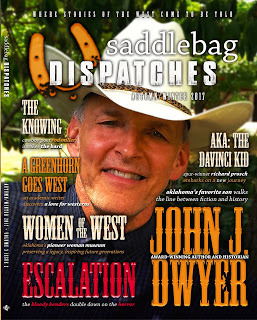
The Fall/Winter 2017 issue of Saddlebag Dispatches is now online, with a print version available as well. As usual, its pages are chockablock with short stories, articles, columns, and other reading matter that “fits under a cowboy hat,” as the editors say.In its pages you’ll find my regular column, “Best of the West,” this time featuring what I believe to be the best cowboy poem of all time, “Anthem” by the late Buck Ramsey.Elsewhere in the magazine is, for me, a real treat—a beautifully designed spread presenting a new poem I penned. “The Knowing” is built from the sights and sounds and smells experienced by a range-riding cowboy through days and nights, miles in the saddle, tending cattle, watching wildlife, experiencing sunshine and storms, and the comfort of campfires. There’s even a reference to the poem on the magazine’s cover (above), claiming, in one of the most extreme over-statements of our time, “Cowboy poet Rod Miller invokes the Bard.”Magazines written for Western readers become rarer by the day, so don’t miss a chance to read—and support— Saddlebag Dispatches .
Published on December 18, 2017 10:13



